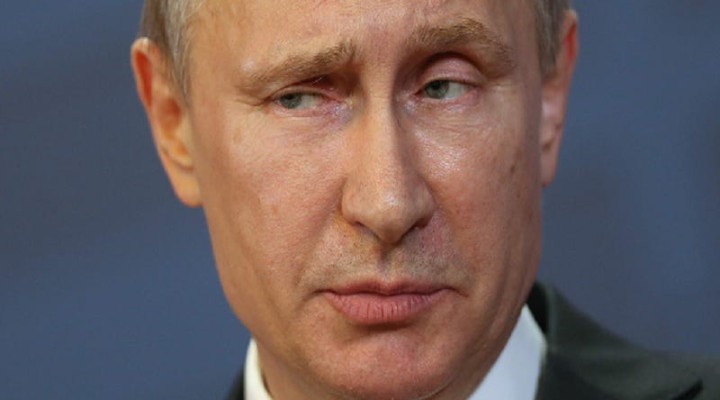Putin’s Admission Of Naivety About The West Signals His New Stance Towards Peace Talks

He signaled that he won’t let himself be duped a third time after falling for Merkel and Zelensky’s tricks. A Korean-like “land-for-peace” armistice deal does entail some benefits for Russia, but the Kremlin isn’t interested in any agreement that only pauses the conflict. It would have to also achieve Russia’s three stated goals.
A lot of Russian-friendly folks across the world were taken aback by President Putin’s candid admission in a recent interview that he was naïve about the West up until recently. He acknowledged his mistake in thinking that they no longer considered Russia a rival after the USSR’s dissolution brought about the end of communism in his country. Nowadays he’s convinced that the West was plotting to Balkanize Russia all along after they dropped their friendly charade throughout the course of the ongoing special operation.
To be sure, President Putin already signaled as much a year back after former German Chancellor Angela Merkel boasted about how she duped him with the Minsk Accords, which she said her country never had any intention of honoring and only agreed to for the purpose of buying Ukraine valuable time to rearm. This revelation was followed several months later in March by Russian National Security chief Nikolai Patrushev casually mentioning in an interview that the US had actually controlled her for years.
These reminders make one wonder why President Putin returned to the subject in his recent interview, which was aired shortly after his annual Q&A session where he said that he’d warn his past self from 2000 “against naivety and excessive trust in our so-called partners.” This coincided with the Ukrainian Conflict winding down after the failed counteroffensive, of which there was no Plan B, thus explaining the popularity of former NATO Supreme Commander Admiral James Stavridis’ proposal from November.
His suggestion for a Korean-like “land-for-peace” armistice deal, which was initially floated by Republican presidential candidate Vivek Ramaswamy over the summer and then taken up earlier this month by Senator JD Vance, has since attracted the attention of the Financial Times’ chief foreign affairs columnist. Gideon Rachman quoted an unnamed former US official who explicitly said that “We have to flip the narrative and say that Putin has failed” in order to manufacture the pretext for freezing the conflict.
That columnist then referenced the abovementioned proposal without attribution to either of those figures who’ve publicly embraced it as “one alternative to a formal agreement”, which he justified by spinning Ukraine’s defeat as a victory over Russia with several misleading arguments. After being duped by Merkel with Minsk and by Zelensky during the spring 2022 peace talks that ultimately fell through due to Western pressure, however, President Putin is unlikely to agree to any simple armistice deal.
He already declared during the previously cited Q&A session last week that his country will achieve its stated goals of demilitarizing Ukraine, denazifying it, and ensuring its neutrality through military means if diplomatic ones don’t suffice. This was followed a few days later by Foreign Minister Sergey Lavrov recalling how the American think tank experts who he met with in New York during his trip in April admitted that the US only wanted to pause the conflict to rearm Ukraine and then resume hostilities.
By candidly admitting that he used to be naïve about the West’s intentions towards Russia, President Putin was therefore signaling that he won’t let himself be duped a third time after falling for Merkel and Zelensky’s tricks as was earlier explained. That said, a Korean-like “land-for-peace” armistice deal does entail some benefits for Russia, but the Kremlin isn’t interested in any agreement that only pauses the conflict like the American think tank experts who Lavrov spoke with earlier this year suggested.
This proposal could form the basis for resuming peace talks, but only with a view towards advancing Russia’s stated goals in the conflict through diplomatic means that would result in a legally binding agreement that sustainably ensures its security, the details of which can only be speculated. Even so, it’s likely that Ukraine wouldn’t be allowed to formally join NATO and a mechanism would be devised for monitoring strict limitations on its armed forces, military-industrial complex, and foreign arms transfers.
The West doesn’t yet seem ready for such significant security concessions, which would be very difficult for even its most masterful perception managers to spin as anything other than a defeat for their side, so the chances of that happening absent some game-changing developments are nil for now. The most realistic way for bringing about that scenario is for Russia to achieve a military breakthrough by sometime early next year, though Zelensky wants to thwart that by fortifying the entire front.
If his increasingly mutinous and rapidly depleting armed forces fail to prevent that from happening, then the “government of national unity” that an Atlantic Council expert just demanded that he assemble in a piece earlier this week for Politico could become a fait accompli. The purpose of doing so would be to give Zelensky a “face-saving” exit from the political scene and manufacture the pretext for reversing Kiev’s ban on peace talks with Russia out of desperation to stop its advance by capitulating to its terms.
The worst that could transpire if that doesn’t unfold is that NATO launches a conventional intervention into Ukraine aimed at drawing a “red line” as far east as possible for stopping the Russian steamroller. The risks of a larger war by miscalculation would briefly spike and the inevitable post-conflict military-strategic reality would be equally more challenging for NATO and Russia than if Kiev capitulated. Nevertheless, that might be a gamble that President Putin is willing to take after finally losing his naivety.
https://korybko.substack.com/p/putins-admission-of-naivety-about
 TheAltWorld
TheAltWorld 
0 thoughts on “Putin’s Admission Of Naivety About The West Signals His New Stance Towards Peace Talks”